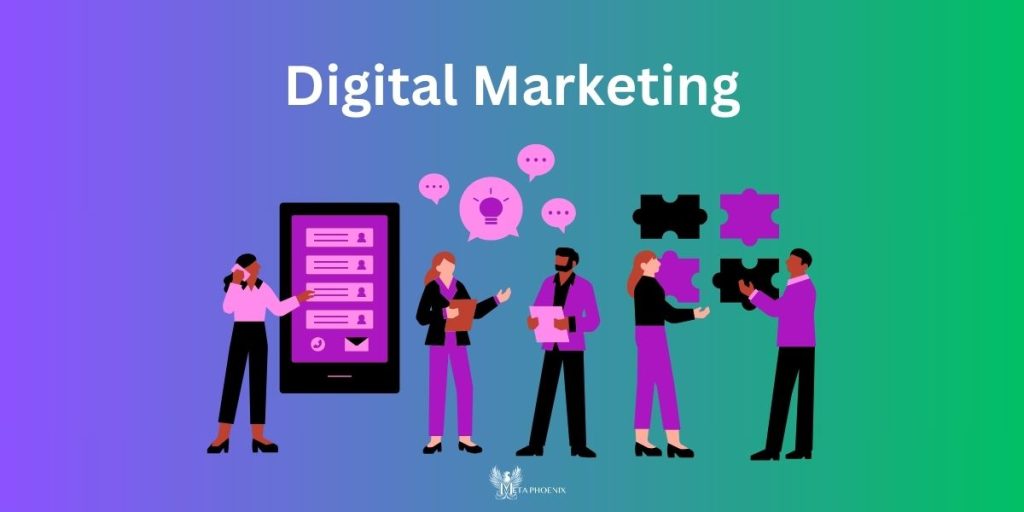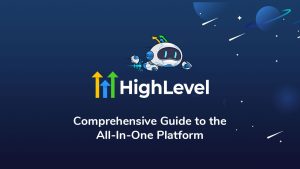Digital marketing is the strategic process of using online channels and technologies to promote products, services, or brands. Marketers leverage data-driven insights to engage targeted audiences, drive conversions, and optimize customer experiences across digital platforms. However, to truly understand the vast array of this specialized industry, you’ll need to understand the different types of marketing in this digital space and how it all ties together in the digital realm.
Why is Digital Marketing Important
Digital marketing has emerged as the present and future of marketing, far surpassing outdated and annoying strategies like direct mail, flyers, and cold calling. Thankfully, marketing has grown and evolved into a digital entity that can theoretically reach consumers worldwide, but that doesn’t state its importance; in fact, it is not even close.
Digital marketing is much more than that; companies that sell products to consumers should want to do so cost-effectively and ethically by ensuring they are targeting the right customers. This is not just to capture the interest of any customer but to actually understand what the product is and who it would be most beneficial to.
One of the biggest issues customers and companies face is advertising fatigue, caused by inattentive marketing departments and companies. Customers are tired of seeing the same ads promoting the same products that do nothing for them. In the best-case scenario, consumers might simply delete the email or scroll past the ad without a second thought. In the worst case, they could develop animosity toward the brand and choose never to become customers.
The goal of digital marketing should be beneficial not only for the company that has acquired a marketing agency’s services but also for the consumer. Nowadays, there is no excuse not to find the right customer for their client.
How Digital Marketing Works
At its core, digital marketing is the practice of promoting brands and products to consumers through digital measures. But, in reality, it’s so much more. Digital marketing is multifaceted, encompassing a variety of channels that each require unique strategies and approaches.
The most effective channels for promoting a product depend on factors such as the product type, industry competition, and the specific target audience. Top marketing firms leverage their expertise and insights gained from A/B testing to determine which channels and tactics will best engage and convert their desired customers.
To be successful in the digital realm of marketing, marketing agencies must understand who they are selling to, the channels they are utilizing, and how to gain their attention long enough to entice them to buy their clients’ products and close on a potential sale.
To do this effectively, marketing agencies will need to create high-quality content that engages customers. But what’s considered high quality? Generally speaking, high-quality content is fresh, unique, and entertaining, but the most significant difference between high-quality and low-quality is that high-quality content offers something of value to the consumer, whether that be some motivating call-to-action, an inspirational tip, or the most effective of all a solution to an antagonizing problem.
Most Effective Digital Marketing Channels
Digital marketing offers a multitude of strategies for businesses to explore. Some methods are straightforward and easy to implement, while others are more advanced, requiring a deeper understanding of sophisticated marketing channels. Below are some of the best and most effective Digital Marketing channels companies and marketing can utilize for their business ventures.
The most effective digital marketing channels are:
Social Media Marketing
Social media marketing is a widely used and effective strategy within digital marketing. It involves leveraging platforms like Facebook, Instagram, LinkedIn, TikTok, and X (formerly Twitter) to promote a brand. The process typically begins with the creation of a business profile or suite on the chosen platforms.
After setting up the account, the marketing team develops content and establishes an ad budget tailored to the campaign’s objectives. The duration and intensity of the campaign are adjusted based on the brand’s goals and the marketing strategy, aiming to achieve the desired outcomes.
The best marketing firms will understand how social media works and the pitfalls and hardships that sometimes hinder the effectiveness of social media marketing. It’s not as cut and dry as many companies may think. A lot of time and money can be wasted if not done properly.
Website
Website marketing is one of the more basic approaches to digital marketing. Although small, websites own a small piece of the vast digital space, which allows companies to promote their brands, products, and services. However, there is much to remember in the digital realm.
The best websites and brands will have the following:
- The same domain and brand name
- User-friendly navigation
- Responsive design on desktop, tablet, and mobile
- High-quality, engaging, and informative content
- Contact information and much more
Search Engine Optimization (SEO)
Search Engine Optimization (SEO) is one of the most underrated and often misunderstood aspects of digital marketing. Many companies mistakenly believe that simply having a website guarantees visibility on popular search engines like Google and Bing. However, this assumption is far from reality.
SEO is a strategic digital marketing effort aimed at securing top positions on search engine results pages (SERPs), particularly in the coveted top three spots on Google or Bing. Achieving and maintaining these positions requires ongoing optimization and adaptation. The goal of SEO is to ensure that when consumers search for a product or service, the client’s offerings appear prominently, outperforming competitors.
Content Marketing
Content marketing is a versatile and powerful digital marketing strategy where marketers create and distribute various forms of content, such as blogs, videos, podcasts, newsletters, and more. The most effective content marketing not only promotes a client’s products, services, and brand but also provides the consumer with something valuable in exchange for their time and attention. This value can come in the form of tips, advice, entertainment, or solutions to specific problems, making the content both engaging and useful.
Email Marketing
Email marketing is one of the older forms of digital marketing, but contrary to popular opinion, it is far from dead. Although it’s not the most effective form of marketing, depending on your strategy and how many times you email your clients regarding your products may determine your success.
Nowadays, no one likes spam; consumers do not want to see companies sporadically emailing them throughout the day about this and that. It’s not fair to your marketing team or the consumer because one of two things will happen: your marketing team will get low engagement, and your potential customer will unsubscribe and think twice about resubscribing.
The best email marketing teams will know and understand the sweet number to send out emails when doing email campaigns, whether that be once a day or once a week. Marketers should optimize their emails to be valuable and engaging.
Affiliate Marketing
Paid Advertising
Paid advertisement is one of the more straightforward approaches to digital marketing. Although important and effective, this is a field that is inundated with many companies using this marketing model and closely relates to social media marketing as Ads can appear on search engines (e.g., Google Ads), social media (e.g., Facebook, Instagram), display networks (e.g., Google Display Network), and video platforms (e.g., YouTube).
However, the Payment models include Cost-Per-Click (CPC), Cost-Per-Impression (CPM), and Cost-Per-Acquisition (CPA), depending on the ad type and desired outcome. Depending on your business and the industry you operate in, it can be an effective strategy, but again, many companies utilize this digital marketing strategy, and if that’s the case your business may need to implement more than one strategy.
Influencer Marketing
Influencer marketing is a relatively new type of marketing that involves influencers. It involves businesses partnering with influential individuals to promote their products or brands to the influencer’s audience. Influencers with significant followings can impact their audience’s opinions and purchasing decisions.
Because this type of marketing is so recent, it’s unclear what benefits it offers businesses in terms of longevity and effectiveness. Although success stories have occurred, more data will be needed to understand its true effect. The strategy is still in its infancy stages.
The most effective influencers are those who are transparent about their marketing practices, provide analytical data and maintain an engaged and active following. However, a common misconception in influencer marketing is that a high follower count automatically translates to high engagement, which isn’t always true.
Companies should be aware that despite an influencer’s large following, engagement levels can vary. Typically, businesses are charged based on the influencer’s follower count, but this doesn’t always guarantee the desired level of audience interaction.
Conclusion
Digital marketing is the strategic use of online channels and technologies to promote products, services, or brands. By leveraging data-driven insights, businesses can engage targeted audiences, drive conversions, and enhance customer experiences. As the future of marketing, digital methods surpass outdated tactics like direct mail and cold calling, offering a cost-effective and ethical way to reach the right customers.
Digital marketing encompasses various channels, each requiring tailored strategies. Effective digital marketing is multi-faceted, involving methods such as SEO, social media marketing, content creation, email marketing, affiliate marketing, paid advertising, and influencer marketing.
Each channel serves unique purposes: SEO aims to improve search engine rankings, social media connects with audiences through targeted content, and content marketing provides valuable information to engage consumers. Email marketing remains relevant when used strategically, while affiliate marketing offers a performance-based approach. Paid advertising and influencer marketing also significantly expand brand reach and drive sales.
Frequently Asked Questions
What is a Digital Marketing Consultant?
A digital marketing consultant can be an individual or a company that provides expert advice and strategic guidance on using digital channels and technologies to effectively achieve marketing goals for the company they were hired by.
Although the advice and guidance can be valuable, they are only required to advise and guide; they typically do not implement their recommendations for the company. Companies looking for a company with the resources to do both will do well to find a hybrid. Companies like Meta Phoenix advise and implement their marketing strategies.
What is Faceless Digital Marketing?
Faceless digital marketing refers to marketing strategies and tactics that do not rely on personal branding or individual identity. Instead, the focus is on promoting products, services, or brands through digital channels without associating them with a specific person. Although this may be effective, giving a brand a face or persona behind the company can help the legitimacy of the brand.
What is Lead Generation in Digital Marketing?
In digital marketing, generating leads refers to the carefully constructed process of attracting and converting online users into potential customers or leads for a business. The goal is to capture interest from people who are likely to be interested in the company’s products or services and collect their contact information for further engagement. This can essentially be done through many channels in the digital marketing industry.







